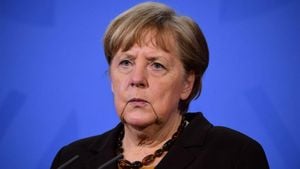The World Health Organization (WHO) made headlines recently by authorizing the first mpox vaccine aimed at children. This groundbreaking decision is met with hope and widespread discussions among health experts who recognize its potential to curb outbreaks of the disease, particularly in regions heavily affected, such as the Congo. The introduction of this vaccine is seen as a significant turning point for public health efforts against mpox, previously known as monkeypox, which is caused by the mpox virus.
The WHO’s decision follows increasing reports of mpox cases especially among children, sparking concerns about the vulnerability of younger populations to the disease. During previous outbreaks, children were identified as one of the hardest-hit demographics, exacerbated by limited access to vaccinations and healthcare resources.
The mpox virus, part of the Orthopoxvirus genus, caused global concern earlier as it spread beyond traditional endemic regions, resulting in sporadic outbreaks. The current outbreaks have reportedly been concentrated mainly in Africa, with the Democratic Republic of Congo being among the most affected areas. Public health officials highlighted the necessity of protection for children, who often present more severe symptoms when infected.
Experts note the vaccine's formulation is deemed safe and effective for pediatric use, addressing the urgent need for immunization strategies targeting younger demographics. "This vaccine will potentially protect children from the severe outcomes of mpox and significantly reduce transmission rates," stated Dr. Jane Smith, professor of infectious diseases at Global Health University.
The mpox vaccine, developed through rigorous clinical trial phases, is expected to be easy to administer, which is integral for school immunization programs. Following the WHO's endorsement, countries are encouraged to integrate this vaccine within their existing immunization schedules for children, aiming to build community immunity rapidly.
Critics, nonetheless, express concerns about the implementation of vaccination campaigns, particularly with previous health initiatives facing challenges including vaccine hesitancy and logistical problems, especially within remote regions where access to healthcare facilities is limited. Educators and health officials are urged to engage communities through informational programs aimed at clearing misconceptions about vaccines.
International initiatives are already underway to maximize accessibility of the new vaccine to children who are at risk. For example, organizations like UNICEF and Médecins Sans Frontières (Doctors Without Borders) are gearing up to support distribution efforts once supply chains have been established. These organizations have amassed field experience responding to similar outbreaks, which will be beneficial as they mobilize to deliver the vaccine to children most affected by mpox.
Aside from the recent authorization of the mpox vaccine, WHO officials have also called for coordinated research efforts to continuously monitor the mpox virus's emergence and mutation, which can potentially alter treatment and vaccination effectiveness. The significance of vaccination promoting herd immunity cannot be overstated, especially within populations susceptible to infectious diseases.
To build effective vaccination awareness, health advocates will implement comprehensive public relations strategies aimed at educating parents and community leaders about the benefits of the mpox vaccine. With stories and testimonials from parents who have vaccinated their children against diseases, they hope to highlight the importance of the mpox vaccine as part of broader preventive health measures.
The WHO anticipates rolling out the vaccine over the coming months, with targeted communications emphasizing the vaccine's role not only as protection for individual children but also as part of collective public health measures. They stress the importance of vaccinations as a community responsibility to prevent outbreaks.
Local health authorities are already planning initiatives to vaccinate children and will collaborate with schools to facilitate convenience and raise awareness among parents. This strategic partnership is viewed as advantageous not just for delivering the vaccine but also for distribution of other needed health services.
While the advent of the first mpox vaccine for children is met with optimism, it is also imperative for health organizations to remain vigilant against misinformation surrounding vaccine safety and efficacy. Continual dialogue among families, healthcare professionals, and community leaders will be key to ensuring widespread acceptance and uptake of immunizations.
Overall, the recent decision by the WHO marks a proactive approach to combating mpox among vulnerable populations, particularly children. Experts believe this new vaccine could significantly change the tide against mpox, especially as countries prepare to respond to future outbreaks with more resources aimed at protecting their younger citizens. With the right strategy and community engagement, the mpox vaccine could herald a new era of preventive health measures for children globally.



